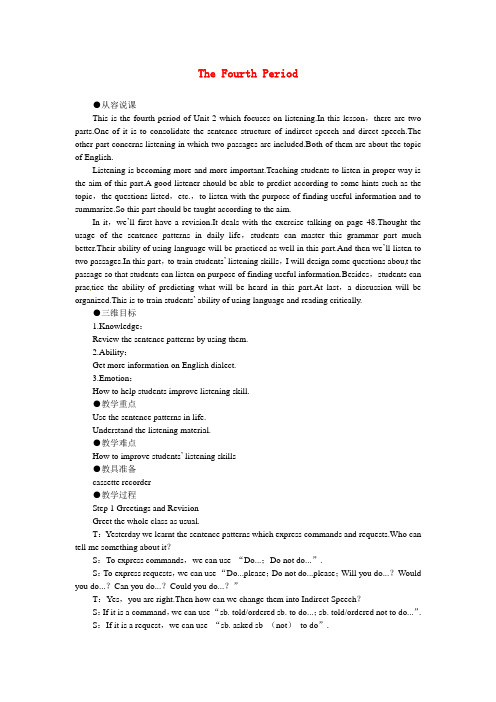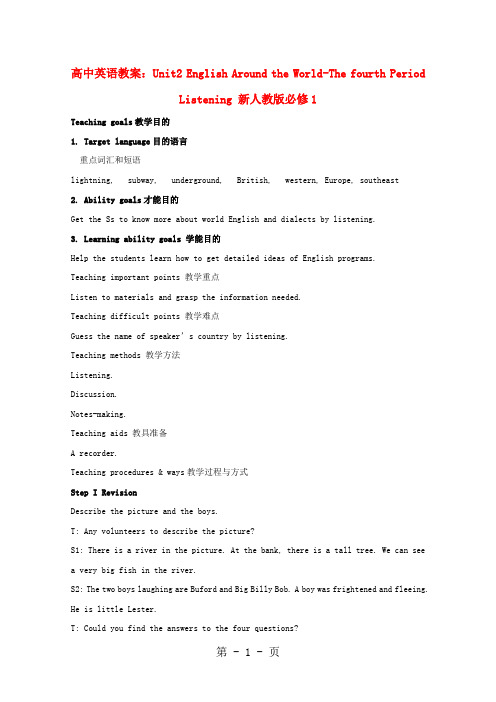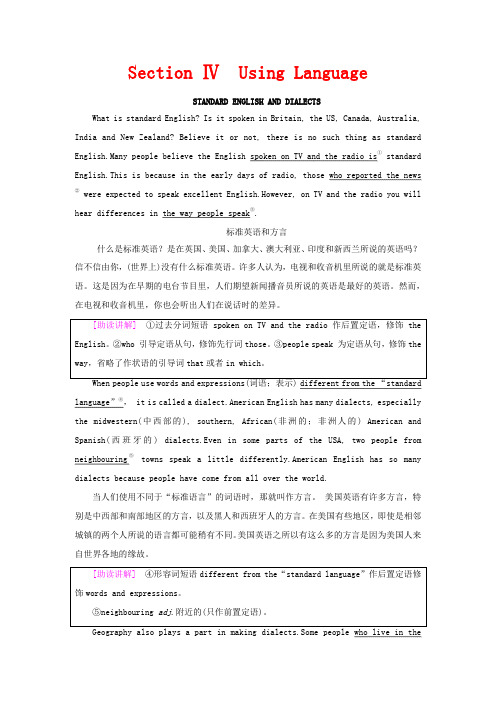高中英语Unit2EnglisharoundtheworldSectionⅣGrammar
- 格式:ppt
- 大小:1.40 MB
- 文档页数:22

u n i t2E n g l i s h a r o u n dt h e w o r l d课文及翻译(总4页)-CAL-FENGHAI.-(YICAI)-Company One1-CAL-本页仅作为文档封面,使用请直接删除the Road to Modern EnglishAt the end of the 16th century, about five to seven million people spoke English. Nearly all of them lived in England. Later in the next century, people from England made voyages to conquer other parts of the world and because of that, English began to be spoken in many other countries. Today, more people speak English as their first, second or a foreign language than ever before.Native English speakers can understand each other even if they don’t speak the same kind of English. Look at this example:British Betty: Would you like to see my flatAmerican Amy: Yes. I’d like to come up to you apartment.So why has English changed over time Actually all languages change and develop when cultures meet and communicate with each other. At fist the English spoken in England between about AD 450 and 1150 was very different from the English spoken today. It was base more on German than the English we speak at present. Then gradually between about AD 800 and 1150, English became less like German because those who ruled England spoke first Danish and later French. These new settlers enriched the English language and especially its vocabulary. So by the 1600’s Shakespeare was able to make use of a wider vocabulary than ever before. In 1620 some British settlers moved to America. Later in the 18th century some British people were taken to Australia too. English began to be spoken in both countries.Finally by the 19th century the language was settled. At that time two big changes in English spelling happened: first Samuel Johnson wrote his dictionary and later Noah Webster wrote The American Dictionary of the English language. The latter gave a separate identity to American English spelling.English now is also spoken as a foreign or second language in South Asia. For example, India has a very large number of fluent English speakers because Britain ruled India from 1765 to 1947. During that time English became the language for government and education. English is also spoken in Singapore and Malaysia and countries in Africa such as South Africa. Today the number of2people learning English in China is increasing rapidly. In fact, China may have the largest number of English learners. Will Chinese English develop its own identity Only time will tell.通向现代英语之路16世纪末期大约有5百万至7百万人说英语,几乎所有这些人都生活在英国。

The Fourth Period●从容说课This is the fourth period of Unit 2 which focuses on listening.In this lesson,there are two parts.One of it is to consolidate the sentence structure of indirect speech and direct speech.The other part concerns listening in which two passages are included.Both of them are about the topic of English.Listening is becoming more and more important.Teaching students to listen in proper way is the aim of this part.A good listener should be able to predict according to some hints such as the topic,the questions listed,etc.,to listen with the purpose of finding useful information and to summarize.So this part should be taught according to the aim.In it,we’ll first have a revision.It deals with the exercise talking on page 48.Thought the usage of the sentence patterns in daily life,students can master this grammar part much better.Their ability of using language will be practiced as well in this part.And then we’ll listen to two passages.In this part,to train students’ listening skills,I will design some questions abou t the passage so that students can listen on purpose of finding useful information.Besides,students can prac tice the ability of predicting what will be heard in this part.At last,a discussion will be organized.This is to train students’ ability of using language and reading critically.●三维目标1.Knowledge:Review the sentence patterns by using them.2.Ability:Get more information on English dialect.3.Emotion:How to help students improve listening skill.●教学重点Use the sentence patterns in life.Understand the listening material.●教学难点How to improve students’ listening skills●教具准备cassette recorder●教学过程Step 1 Greetings and RevisionGreet the whole class as usual.T:Yesterday we learnt the sentence patterns which express commands and requests.Who can tell me something about it?S:To express commands,we can use “Do...;Do not do...”.S:To express requests,we can use “Do...please;Do not do...please;Will you do...?Would you do...?Can you do...?Could you do...?”T:Yes,you are right.Then how can we change them into Indirect Speech?S:If it is a command,we can use “sb. told/ordered sb. to do...;sb. told/ordered not to do...”.S:If it is a request,we can use “sb. asked sb (not)to do”.T:Please tell which one is the right answer.“____________,”Li Ming said to his teacher.A.Can you buy me a new watch?B.Give me that book,C.Lend me your bike,D.Could you help me with my English?S:I think D is the right answer.T:Could you tell me why?S:Because A is not logical.B and C are commands.In last period we learnt that commands should be made by people who have authority.So I think here D is right.T:Your explanation is perfect.Step 2 Talking (Workbook P48)T:Great.Now let’s practise the sentence patterns by making up dialogues.So please turn to P48 and look at the part of talking.Plea se work in groups of four.And choose one situation to role-play.(5 minutes for preparation)T:Now let’s begin.Possible version:Group 1:A.(foreigner):Excuse me,could you give me a hand?B:Sure.You seem to be looking for someone.A:Yes.My Chinese friends and I promised to meet at the exit of the subway.B:Could you speak a bit slowly.I can’t quite follow you.I guess you are looking for your Chinese friends.A:I’m sorry.I wasn’t noticing it just now.Yeah,we said that we would meet here—the exit of the subway at 2 p.m.And it is 2:15,but I still can not find them.B:Exit 1 or Exit 2?A:What do you mean?There’re 2 exits?B:Yes.Here are two exits.So you should be sure which one is where you promised to meet.A:I see.I am sure that they must be waiting for me at the other exit.Thank you very much!Group 2:(P:parents;W:waitress;Y:you)P:Excuse me,could you tell me where the toilet is?W:Er...the restroom?Well,go straight ahead,and it will be at the end of the corridor.P:But we do not need rest.We are just looking for a toilet.Y:I mean we want to go the WC.W:WC?We don’t have one.Y:No WC!How can a restaurant have no WC?W:I’m sorry!But what do you really mean by saying WC?Y:It’s a place where we can wash hands.W:Ah,I see.Well,go up to the second floor.Y:Thank you so much!(You and your parents go up two floors but only find empty rooms there.)W:Have you found it?Y:No,we went up two floors,but we didn’t find a toilet but empty rooms.Group 3:A:Excuse me,could you help me?B:Sure?What’s it?A:Our English teacher is telling us something important,but I can quite follow her.She’s speaking so fast.B:Yeah,she’s really speaking fast.Then how can I help you?A:Could you ask the teacher to speak a little bit slowly?B:Of course I can,but why don’t you do so?A:Er...B:I see.(Student B puts up his hand)T:Yes?B:I’m sorry,but would you speak a little slowly?Step 3 Listening (Ⅰ)T:Yesterday,we have learnt something about dialects in the US.Today let us listen to the dialogue spoken with an accent.Please turn to the listening part on P14.First listen and find out how many people there are in the dialogue and who they are.S:...T:Great!Now please listen to it again,and answer the questions on the text book.(after listening)Have you got the answers?Now compare notes with your partner.T:Are you sure about your answers now?Let’s check together.T:You did a very good job.Now we will listen to it again.After that,you should retell the story to your partner.See?S:...T:So you see,there is some difficulty for people to understand the dialects.Right?So what we do while learning English?S:We can learn standard English.S:I don’t think so,because we have learnt that there’s no standard English actually.So I think what we should do is to pronounce better,and use the correct words and grammar.Step 4 Listening (Ⅱ)T:By reading the passage “the road to modern English“,we have known English is a world language which is spoken in many countries and areas.In this period we will listen to native speakers from different English-speaking countries.Please move to P51 and look at Listening Task.Now several students in an international high school in Shanghai are describing where they come from.What do you think you will hear in their introduction?S:I guess they will talk about the location,climate,people,custom,specific things,and so on.T:You are very clever.We are introducing some place,most of time we will give som e description of the climate,people,custom,people,history,places of interests,and so on.T:Listen carefully,then tell which topics are mentioned.S:...T:Good.Then I will play the tape again.This time you should try to guess the name of each student’s country.S:...T:Good job.This time,you should pay much attention to each student’s description.After listening it again,you should describe the country using your own words.S:...T:Well done!Now work in groups of four and discuss with your partners why English is spoken in so many places around the world.Make a list of the reasons and then report your group work with other groups.Step 5 SummaryThis class we have review the grammar part by using it in daily life.We have practised reading as well.We learn the language in order to use it.So I advise you practise using what we learnt daily so that they can be part of your knowledge.Step 6 HomeworkLook up the words left in the vocabulary in the dictionary.●板书设计Unit 2 English around the worldThe Fourth PeriodSentence patternsGuessing the topics mentioned in the tape●活动与探究This activity is to do some research on the listening skills.Students are required to surf the internet to search for some information on advice on improving listening.●备课资料ColorsAmericans have used colors to create many expressions they use every day.We say we are “in the pink”when we are in good health.It is easy to understand how this expression was born.When my face has a nice fresh,pink color,it is a sign my health is good.If I look gray and ashen,I may need a doctor.Red is a hotter color than pink.And Americans use it to express heat.In English,the small and hot peppers(辣椒)found in many Mexican foods are called “red hots”,for their color and their fiery(火辣辣的).We say that fast,fiery music,especially the kind called “Dixieland Jazz”is “red hot”.Blue is a cooler color.The traditional blue music of American blacks is the opposite of the red hot music.It is slow,sad and soulful.Duke Ellington and his orchestra (管弦乐队)recorded a famous song,Mood Indigo(《深蓝的情调》),about the deep blue color,indigo.In the words of the song,“You aren’t been blue till you’ve had that Mood Indigo”.To be “blue”,of course,is to be sad.While the color green is natural for trees,it is an unnatural color for humans.When someone does not feel well,someone who is sick for example,we say he looks green.When someone is angry because he does not have what someone else has,we say he is “green with envy(忌妒)”.Some people are “green with envy”because someone else has more dollars,or “greenbacks”.Dollars are called greenbacks because that’s the color of the back side of the money.The color black is often used in expressions.People describe a day in which everything goes wrong as a “black day”.A “black sheep”is the member of a family or group who always seemsto be in trouble.A “bla cklist”is illegal(非法的)now,but at one time,some employers shared blacklists of people who should not be given work.Not all the “black”expressions have bad meanings.A business “in the black”,for example,is one with profits(利润).A company “in the red”is losing money.Red ink is used to show losses in a financial report.Profits are written in black.If someone tells you to put something “in black and white”,they want you to write it down.In some cases,colors just describe a situation.A “black out”,in World War Two,was when all lights were turned off to make it difficult for bomber planes to find their target(目标)at night.A “brown out”is an American expression for reduced electrical power which makes electric lights dim.American women use the French word for red as the name of the colored cosmetic(化妆品)which they sometimes use to brighten their cheeks.It’s just called “rouge”.They use it especially when they are going out for the evening,or as Americans say “to paint the town red”.The color yellow is sometimes used to describe a coward(胆小鬼).A person who is “yellow”has no courage.A person’s skin may become yellow as a result of diseases that attack the liver(肝).Yellow fever is one.In the past,ships carrying fever victims raised a flag called the “yellow jack”.In the United States,an activist o rgan ization of old people calls itself the “gray panthers”(灰豹).The name comes from the gray hair of its members and from the panther,a fierce animal of the lion or leopard(豹)family.Words and IdiomsTo eat crow乌鸦肉根本没法吃,因此要一个人吃乌鸦,那肯定是非常难受的。

高中英语教案:Unit2 English Around the World-The fourth PeriodListening 新人教版必修1Teaching goals教学目的1. Target language目的语言重点词汇和短语lightning, subway, underground, British, western, Europe, southeast2. Ability goals才能目的Get the Ss to know more about world English and dialects by listening.3. Learning ability goals 学能目的Help the students learn how to get detailed ideas of English programs.Teaching important points 教学重点Listen to materials and grasp the information needed.Teaching difficult points 教学难点Guess the name of speaker’s country by listening.Teaching methods 教学方法Listening.Discussion.Notes-making.Teaching aids 教具准备A recorder.Teaching procedures & ways教学过程与方式Step I RevisionDescribe the picture and the boys.T: Any volunteers to describe the picture?S1: There is a river in the picture. At the bank, there is a tall tree. We can see a very big fish in the river.S2: The two boys laughing are Buford and Big Billy Bob. A boy was frightened and fleeing. He is little Lester.T: Could you find the answers to the four questions?Ss: Yes.T: Good. Why does Buford think of Texas? How do you know it?S: He believes it’s almost a different country from the US. The text tells us so. T: How large was the catfish?S: The catfish was almost the size of a house.T: Why did Lester get out of the water very quickly?S: He thought the catfish would eat him.T: Why did Buford and Big Billy Bob laugh?S: Because the fish is harmless but Lester is so frightened and flee so fast.Step II Listening and writing (Page 14)Task Listen and answer questions.T: Another two persons will describe this story. One is Buford, who is from Texas and believes bigger is always better. He is speaking with one kind of Southern dialects. The other is his teacher, Jane, who speaks standard British English. First, listen and know of standard British English and Southern dialects.Ss listen to the tape and try to understand.T: Now listen for a second time and answer the last two questions. Make notes while listening.A few minutes later, check their answers.T: A, can you answer question 5?S: Yes. Jane is the second speaker, Buford’s teacher. She is from Britain.T: Well done! Buford says “Hey, y’all〞to greet you. What does the second speaker say to greet you?S: She says “Hel lo〞.Step III ListeningTask1 Listen and write the AE words.T: Last lesson we separate some AE words from BE words. Today, let’s go on listening and write down the AE words which have the same meanings as the BE words. Turn to page 48 .Listening .The BE words have been written down. Read it. Then listen to the dialogue. In the conversation, “rush hour〞 is the name of a popular Hollywood film.After listening.T: Please read your answer together. (Write down the answers.Ss: picture- movie, lorry- truck, autumn- fall, underground- subway, sweets- candy Task2 Listen and write down answers to questions.Ss read the questions to find out the listening point first, and then listen to the tape to get the answers.T: Now the recorder will introduce a new way of English learning. Before listen to the tape, please read the questions to find out the listening point. Make notes of the answers while listening.Play the tape for the first time so that the students can get a general idea. The second and third time, the Ss write and check their answers. Pause and repeat the key sentences.T: Can you answer questions now?Ss: Yes.T: Good. What programme is Zhao Li watching?S: CCTV-9 World wide watch.T: Excellent! Who would like to answer the next questions?S: 2. Zhao Li thinks that watching TV programs will improve her English.3. She thinks that Cao Ri is a good speaker.4. The more listening practice you have, the better your listening skills will get, especially if you hear variety of speakers.5. You should be patient and keep trying. Soon you will understand more and more. Teacher checks the answers and explains some difficult listening points if necessary. Step IV Listening TaskTask 1 Read the map and listen and find where the students come from.T: Please turn to page 51 and read the map. What does it tell us?S: It marks the places where English is spoken as a first or second language. Maybe it is about world English.T: Very clever! Now six foreign students come to our class to learn Chinese, and they are introducing themselves. Please listen carefully, and then write their names onthe proper places on the map.It is a little difficult to finish the task individually. The teacher may do the first one with the Ss. While listening, repeat the key sentences.T: Let’s guess the first one together.Play the tape.T: From the first sentences and “British rulers〞, we know S1 comes from India. Go on listening and write down your answer on the map.Ss listen to the tape and write down their answers. Teacher plays the tape twice.A few minutes later.T:Check your answers with your partner. Listen to the tape again.T: OK, where is S2 from?S: S2 is from Louisiana in the US.T: What about the others?Ss: S3 is from Jamaica, S4 Ireland, S5 the Philippines, and S6 Singapore.T: Very good.Step V HomeworkMake a short list of reasons why English is spoken in so many places around the world. Preview Page 15 Speaking. List the words that were confusing to Amy.SampleWhy English is spoken in so many places around the world?English is the language most widely spoken and used in the world. Why? Industrial revolution impelled the development of England and it colonized much of the world. English began to be spoken in many other countries. America’s development also contributes to the extension of English. With the development of economy, countries communicate with each other more frequently.English is widely used and is one of the official languages of the Olympic Games and the United Nation. People realize the importance of English learning. Everywhere in the world children go to school to learn English. More people speak English as their first, second or foreign language.。



Section ⅣUsing LanguageSTANDARD ENGLISH AND DIALECTSWhat is standard English? Is it spoken in Britain, the US, Canada, Australia, India and New Zealand? Believe it or not, there is no such thing as standard English.Many people believe the English spoken on TV and the radio is① standard English.This is because in the early days of radio, those who reported the news ② were expected to speak excellent English.However, on TV and the radio you will hear differences in the way people speak③.标准英语和方言什么是标准英语?是在英国、美国、加拿大、澳大利亚、印度和新西兰所说的英语吗?信不信由你,(世界上)没有什么标准英语。
许多人认为,电视和收音机里所说的就是标准英语。
这是因为在早期的电台节目里,人们期望新闻播音员所说的英语是最好的英语。
然而,在电视和收音机里,你也会听出人们在说话时的差异。
) different from the “standard language”④, it is called a dialect.American English has many dialects, especially the midwestern(中西部的), southern, African(非洲的;非洲人的) American and Spanish(西班牙的) dialects.Even in some parts of the USA, two people from neighbouring⑤towns speak a little differently.American English has so many dialects because people have come from all over the world.当人们使用不同于“标准语言”的词语时,那就叫作方言。